Andrik Puentes’ journey to graduation at the University of Rhode Island has been an extraordinary blend of academic rigor and leadership that significantly shaped his path to become an engineer.
“The university’s commitment to diversity and inclusion was particularly compelling, as it aligns with my values and the importance of creating an environment where all students can thrive,” said Puentes.
What distinguished the College of Engineering at URI and solidified his decision to attend were its state-of-the-art facilities and a strong emphasis on research and mentorship. “The university’s commitment to diversity and inclusion was particularly compelling, as it aligns with my values and the importance of creating an environment where all students can thrive,” said Puentes.
URI’s proactive outreach efforts during his high school years played a significant role in the choice. The university’s support and the informative interactions he had with faculty and current students made URI standout among other institutions. Additionally, the campus environment was a major factor in his decision. The calm setting and welcoming atmosphere provided the ideal environment for rigorous academic pursuits. It was the combination of these advanced academic resources, inclusive culture, and supportive environment that made URI the perfect choice for his studies.
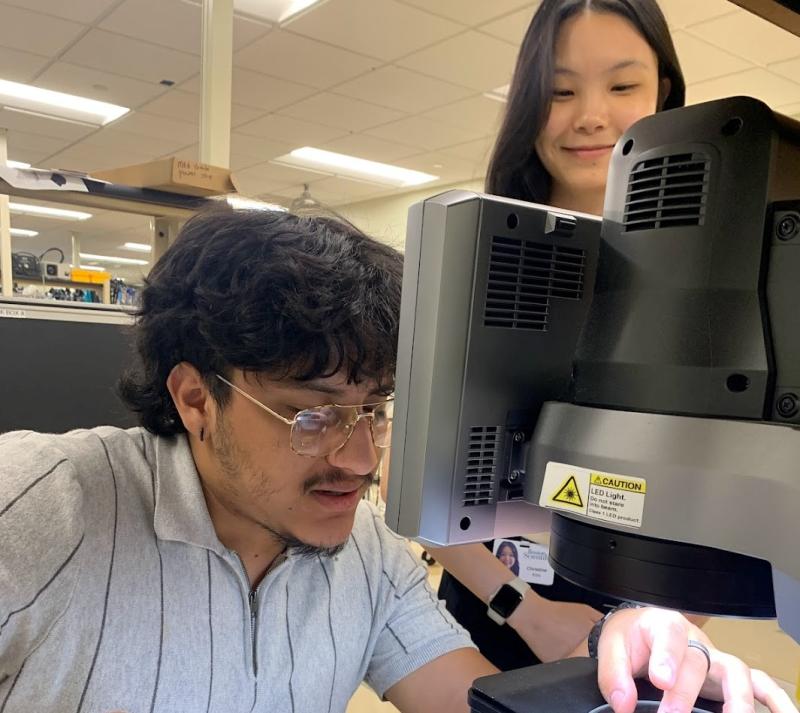
As a first-generation college student, the foundational support from URI’s Talent Development Program launched his academic career on solid footing. The fellowship and shared ambition within the Engineering Learning Communities provided not only support, but also, lifelong friendships.
Andrik decided to pursue a mechanical engineering degree out of a deep curiosity about how things work. It all started with computers. He was fascinated by the challenge of building powerful machines from mere scraps, dismantling them, and piecing them back together. This hands-on approach wasn’t just about assembly, but it allowed him to explore software like CAD and simulation tools. “I dove headfirst into self-teaching. These programs, exploring scientific concepts, coding, and anything I thought was interesting along the way,” said Puentes.
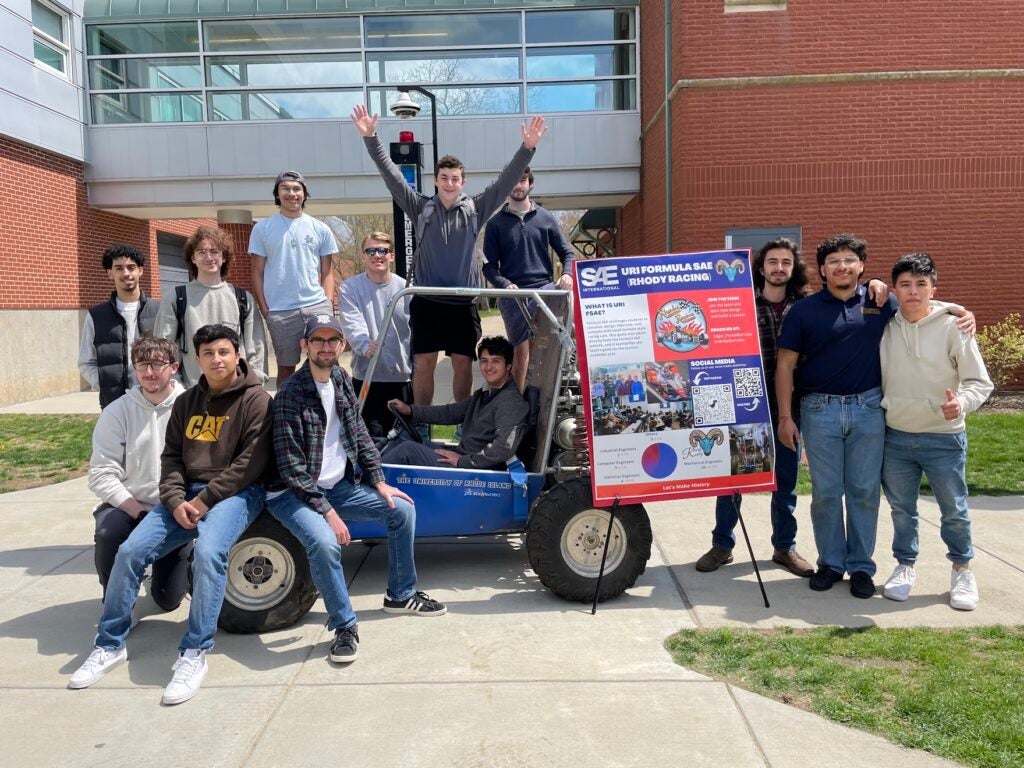
His curiosity didn’t stop there; it soon expanded to engines and racing vehicles. “I was captivated by the complexity and precision of engines; how meticulously designed components came together to create such powerful machines. My appreciation for engineering deepened as I explored automotive engineering, especially the flawless mechanics of engines and race cars.” This journey of discovery wasn’t just about understanding how individual parts functioned, but it was about piecing together a larger picture of how the world operates. The more he learned, the more questions he had, and it became clear that engineering was the path that would allow him to explore these endless curiosities. Ultimately, engineering provided the perfect blend of theory and practical application, feeding his desire to understand and innovate in the world around me.
This interest paved the way for Puentes to join, and ultimately lead, the student group, Formula SAE (Society of Automotive Engineers). He joined the initiative to start the team at URI, which initially focused on an electric car. His dedication and vision for the team led to his presidency, during which the team launched the first-ever gas-powered car project. From late 2021 until May 2024, Puentes led the team, expanding their membership and solidifying a legacy of innovation and leadership.
“It was a technical challenge that tested my creativity and perseverance,” said Puentes. His involvement in student organizations at URI was both a response to need and a pursuit of passion. Many of these groups were struggling to regain momentum post-COVID, or they simply didn’t exist and needed to be introduced at the university.
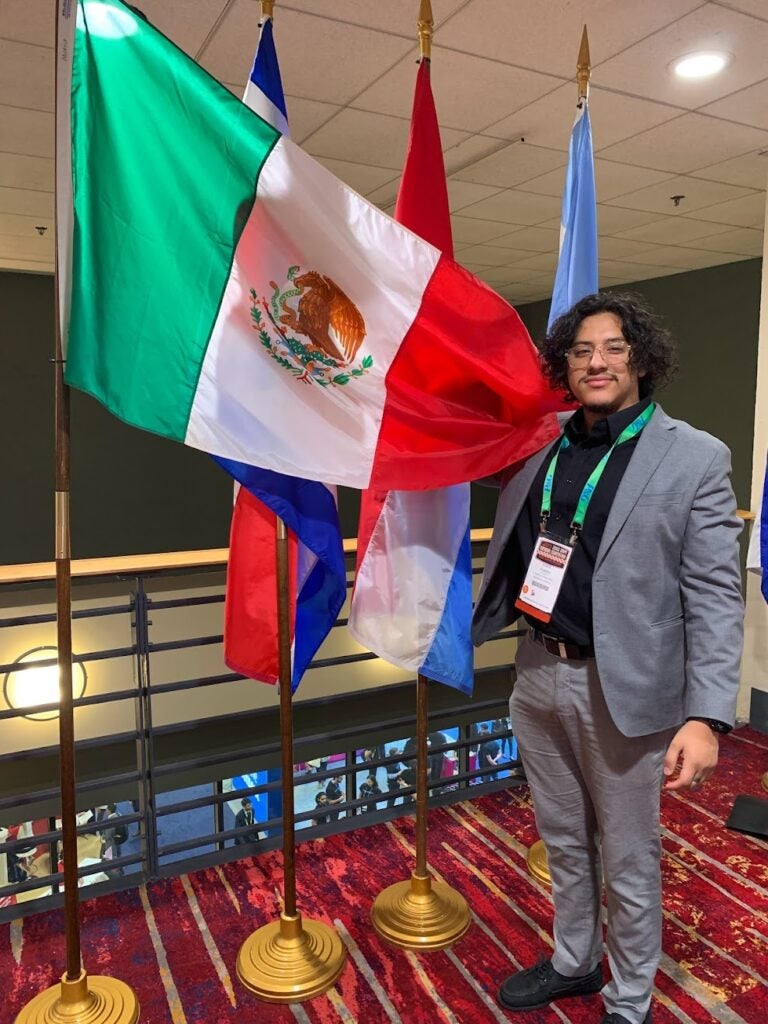
Similarly transformative was his experience with the Society of Hispanic Professional Engineers, which he joined shortly after second year, encouraged by his advisor. He instantly connected with SHPE’s mission, and during the pandemic, seized the opportunity to elevate his role, quickly advancing to the executive board. “Rebuilding SHPE after COVID was challenging but incredibly fulfilling, allowing me to directly impact its resurgence and future direction,” said Puentes.
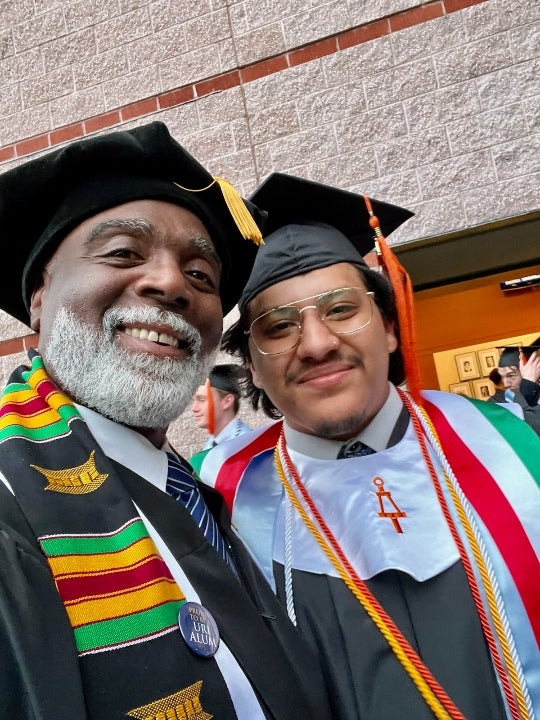
These organizations taught Puentes practical applications of classroom theories, from engineering to public speaking, leadership, and commitment. “They have profoundly shaped me into the engineer I am today. The invaluable support and guidance from mentors, professors, and the College of Engineering faculty were crucial in bringing these visions to life.” He states that the engagement with these groups allowed him to connect with diverse faculty members, gain a wealth of advice and deepen his professional acumen. “The student organizations at URI were not just extracurricular activities, they were integral to my educational experience and personal growth. They were invaluable to me,” said Puentes.
His final year, together alongside colleague Mycarthy Newton, they founded URI’s first chapter of American Institute of Aeronautics and Astronautics. “Our shared passion for aerospace drove us to establish a new avenue for students to explore and excel in this exciting field,” said Puentes.
In addition to student organizations, Puentes took internships at Boston Scientific and Hexagon Manufacturing Intelligence that gave him a glimpse into the professional world of engineering. It was at these internships that he navigated the complexities of FDA standards and surgical device innovation and ensured precision industrial applications through advanced programming of Coordinate Measuring Machines.
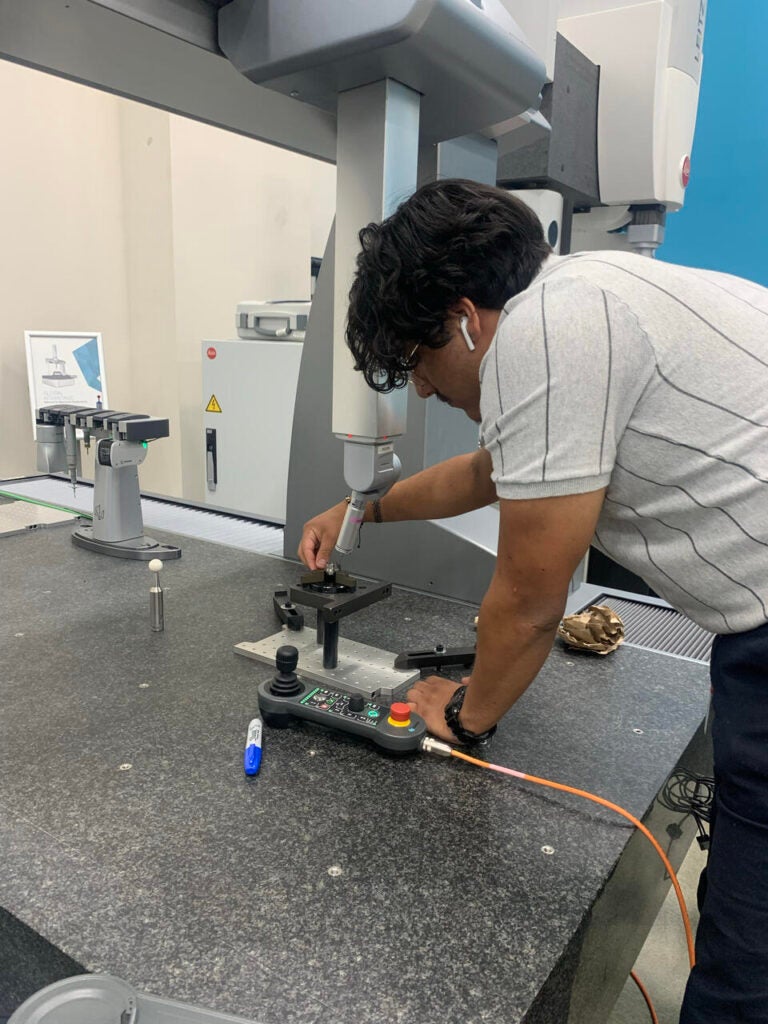
In the URI Intelligent Controls and Robotics Lab, under the guidance of professors Paolo Stegagno and Chengzhi Yuan, he also delved into pioneering research in robotics. His projects included developing advanced control systems for swarm robotics, and multi-gait soft robots, which involved intricate programming and design to create adaptable robots for diverse applications. “This research not only expanded my technical expertise but also enhanced my ability to think innovatively and solve complex problems,” said Puentes.
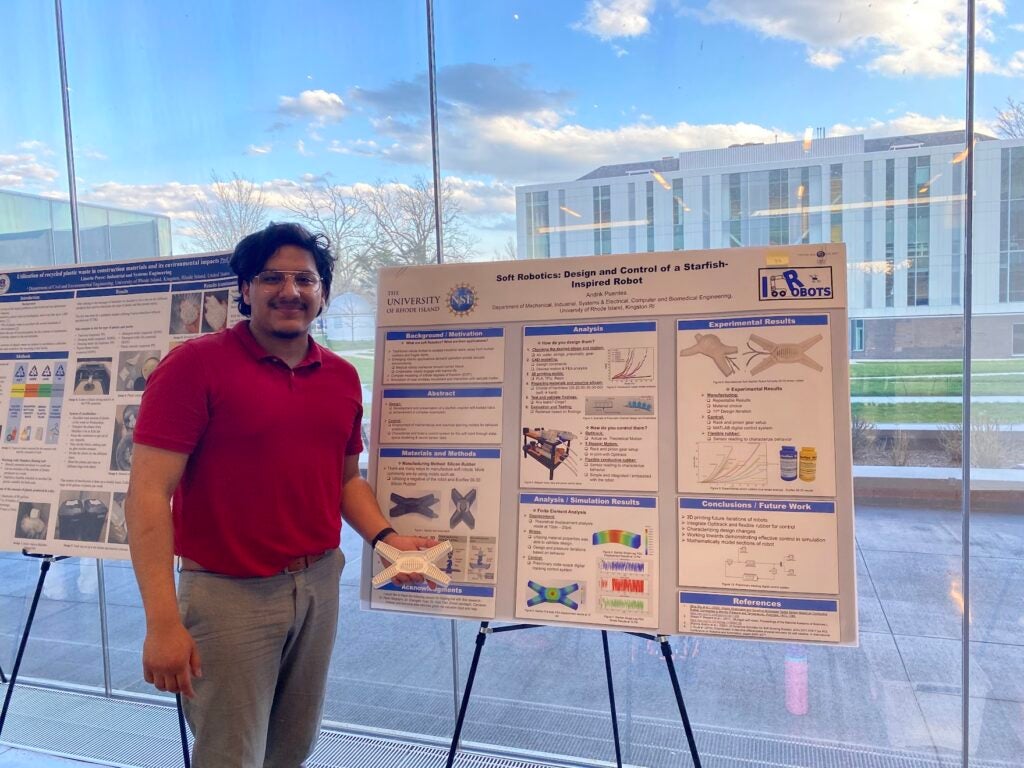
“The pinnacle of my academic efforts was my senior capstone project in collaboration with NASA’s Marshall Space Flight Center, focused on developing a Centrifugal High Performance Nuclear Thermal Propulsion system for Mars missions.” He says the project explored the complexities of turbine design and propulsion efficiency, and as team lead, he gained leadership and project management experience.
As the first-generation student in his family to pursue a secondary education degree, learning how to learn was a significant challenge. “Freshman year, which coincided with the COVID-19 pandemic, tested my motivation, and required a steep adjustment from high school to college. The main difficulty I faced was managing my time effectively to maintain high standards in both academic and extracurricular activities.”
To overcome this, he employed a variety of organizational tools such as calendars, notebooks, timers, and whiteboards around his room. These tools helped him structure his days, ensuring he could balance extracurriculars while still finding ample time for study and classwork.
A pivotal resource was the Talent Development (TD) program, which included a class focused entirely on study techniques, organization, and strategies for success at URI. This class was instrumental in shaping his approach to college, smoothing the transition during a challenging time.
Additionally, the support from the Engineering Learning Communities was invaluable. “The ELLC provided a network of like-minded peers and a supportive environment that was crucial for both academic and personal growth. The advisors at the college also played a critical role, offering guidance and support that helped me navigate the complexities of an engineering curriculum.”
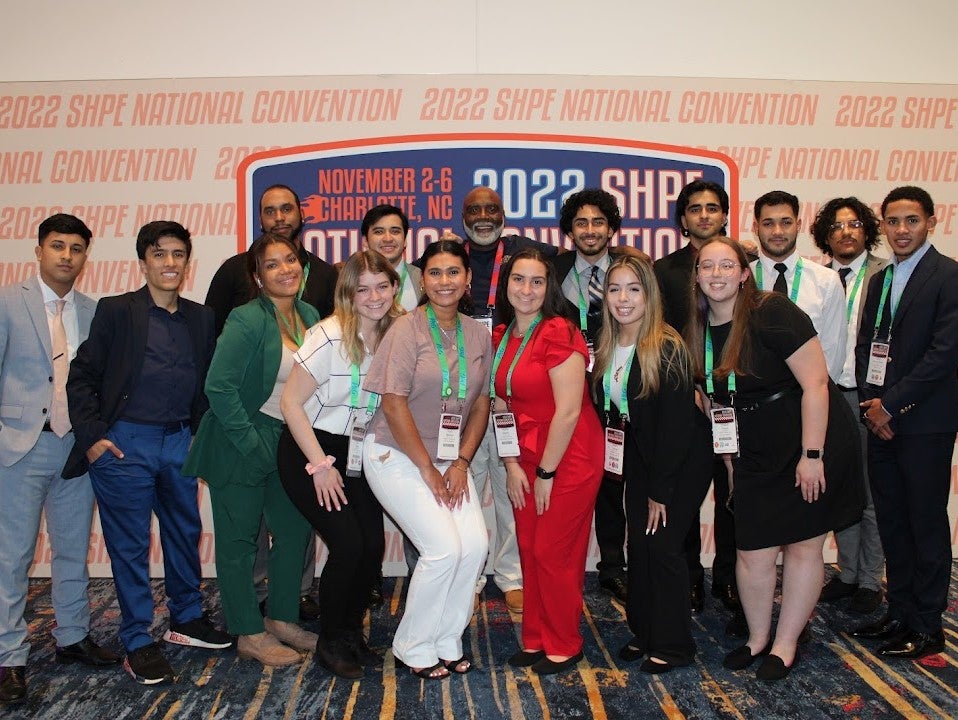
The Society of Hispanic Professional Engineers (SHPE) also provided tremendous support, with conferences and networking opportunities that kept him motivated and focused. Through these resources and communities, he found more than adequate assistance to tackle the challenges he faced, enabling him to maintain a high GPA and active participation throughout his college career.
“Reflecting on my time at URI, I am deeply grateful for the opportunities that have allowed me to grow academically, professionally, and personally. These experiences have equipped me with a robust foundation to tackle the challenges of an engineering career with confidence and enthusiasm,” said Puentes.
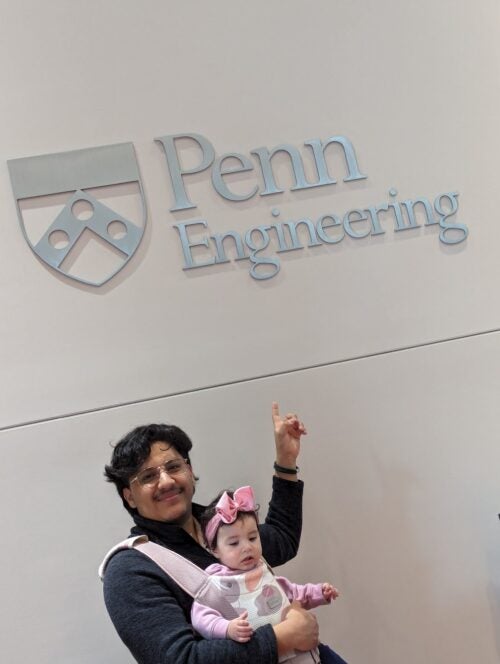
Puentes is ‘thrilled’ to be continuing his academic journey at the University of Pennsylvania where he will be pursuing a master’s in mechanical engineering and applied mechanics. “This opportunity to delve deeper into engineering concepts is a privilege that aligns perfectly with my lifelong commitment to learning and exploring the world through an engineering lens,” said Puentes.
This summer, he has begun an internship at Eaton Aerospace as a Manufacturing Engineering Intern. The role provides him with experience in manufacturing and aerospace, enhancing his understanding of industry processes and preparing me for future challenges.
“Looking ahead, one of my key goals is to pave the way for other Latinos and first-generation students such as myself. I am passionate about mentoring and fostering diversity in engineering. My experiences have taught me the immense value of having a team with diverse backgrounds, pulling from my experience, it enriches perspectives and enhances our approach to solving complex problems,” said Puentes.
In the long term, Puentes dreams of expanding his impact by engaging in public speaking, particularly in low-income communities. He hopes to introduce engineering concepts into their curriculum, inspiring the next generation to pursue STEM careers. “By sharing my journey and the lessons I’ve learned, I aim to make engineering accessible and exciting for those who might not see it as a viable path.”
Ultimately, he wants to contribute to engineering solutions that are not only innovative, but also inclusive, reflecting the diverse world we live in. “I am excited about the possibilities that lie ahead and am eager to continue making a meaningful impact in the field of engineering.”
